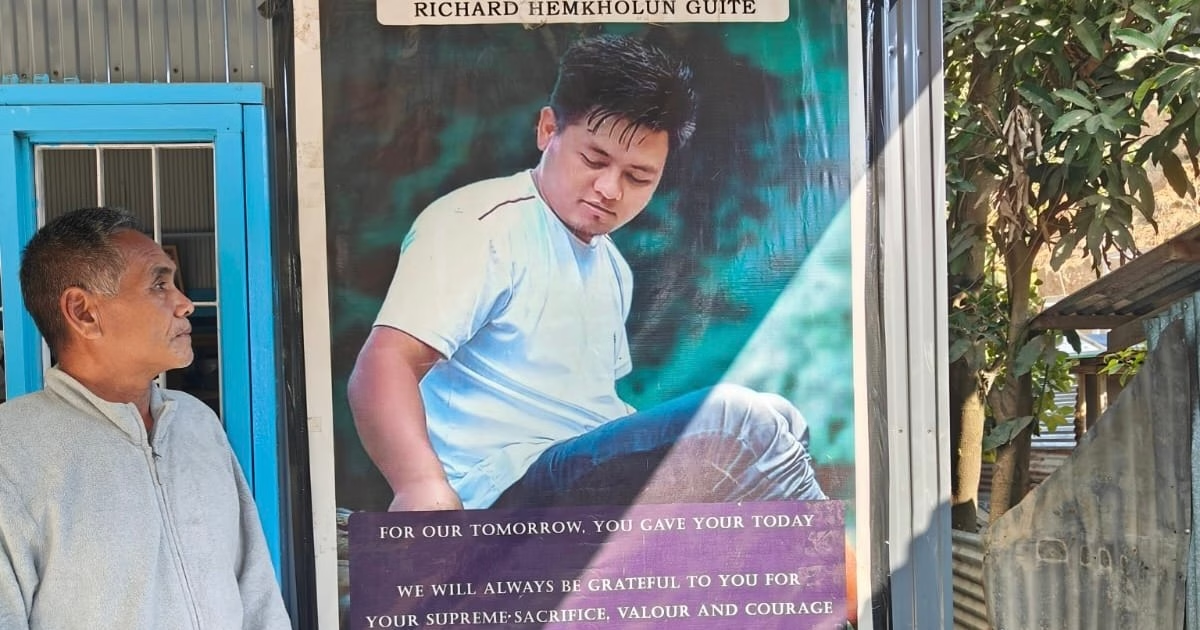Every time 13-year-old Selina Mairembam tries to write or eat with her right hand, the pain and the scars remind her of the day she was nearly killed by a bomb. She was knocked out instantly. When she woke up, there was blood everywhere. For a moment, she thought she was dead. Talkative once, Selina now barely speaks. Holding out the jagged pieces of bomb shrapnel that tore through her arm, she whispers to me, “I’m always scared. I don’t want to be scared.”
Selina is the great-granddaughter of Mairembam Koireng Singh, the first chief minister of the northeastern Indian state of Manipur. On September 7, 2024, while she was helping a priest arrange a ritual for her grand-aunt’s death ceremony, a “big rocket” came out of nowhere. She remembers no flash, only the deafening sound – so loud she thought her ears had been blown off.
The improvised bomb struck the house of the former chief minister in the heart of Moirang town, near Loktak Lake, the largest freshwater lake in northeast India. Selina survived with severe injuries, but the missile killed 72-year-old RK Rabei, a priest and event manager. His bloodied body was found by his daughter-in-law and granddaughter. Four-year-old Gianna Rajkumari often wakes up at night, screaming – haunted by the image of her grandfather’s mutilated body.
Palmei Houjellu, Gianna’s mother, was nine months pregnant at the time. The 35-year-old from Moirang had gone with her daughter to attend the ritual organised by her father-in-law. Just minutes before the attack, Houjellu and Gianna had stepped out for a short five-minute trip home to fetch a few things for the ceremony. That saved them.
A day later, Houjellu gave birth to a baby boy. But even as she cradles new life, death still lingers in their home. “My daughter saw her grandfather’s bloodied body,” she said. “She still wakes up screaming at night. She keeps asking, ‘Who killed Nana? Why?’ And I have no answer for her.” “Did she deserve this?” Hovjellu belongs to the Meitei community, the largest ethnic group in Manipur, a state devastated by a deadly ethnic conflict over the past two years. The violence was sparked by a dispute over an affirmative action measure. On April 14, 2023, the Manipur High Court directed the state government to recommend Scheduled Tribe status for the Meitei community – a decision later criticised by the Supreme Court.
In response, tribal communities that already had these benefits organised protest rallies on May 3, while the Meitei community held counter-rallies and counter-blockades. Clashes soon erupted between Kuki and Meitei groups near the border of Churachandpur and Bishnupur districts, followed by widespread arson and destruction. The conflict has never fully subsided – more than 260 people have been killed, and more than 65,000 have been displaced.
Amid growing public pressure and the threat of a vote of no confidence from the opposition Congress party in the state legislature, Chief Minister N Biren Singh – a footballer-turned-politician who is Meitei and has been accused of inflaming tensions in the state – resigned in February. Like the bomb that struck Hovjellu’s father-in-law, a wide range of mortars, grenades, homemade rockets, and thousands of weapons with lakhs of rounds of ammunition have landed in the hands of warring communities over the past 20 months.
Security forces have managed to prevent new outbreaks of violence in recent weeks, and public anger has claimed Singh’s political scalp. But with hamlet after hamlet armed and the state’s credibility at an all-time low, military experts and local communities say Manipur is a tinderbox that could explode at any time, again. many of the weapons recovered and surrendered since the conflict began are far more advanced than those looted from state armouries. These include M4s, M16s, sniper rifles, machineguns, and handguns smuggled from Myanmar and Bangladesh. However, neither side has surrendered the more sophisticated weapons they are known to possess.
Besides this, both sides also improvised their own local weapons and heavy arms. Kuki-Zo fighters have been found using improvised rockets made from galvanised iron and metal pipes, known as “pumpi”, while Meitei fighters have developed their own makeshift wheeled mortars.
The result: Civilians, armed with looted weapons and trained by fighter groups, have launched mortar and bomb attacks on each other. Villages were set on fire overnight. The bodies of civilians – including charred women, beheaded men, and children with their skulls crushed – lay scattered. Al Jazeera has accessed videos of men – both Meitei and Kuki – cheering as they fired mortars and tested homemade rockets at each other. Security officials have verified the authenticity of these videos. Al Jazeera has also confirmed that many young Meitei and Kuki civilians died after their bombs and rockets exploded while they were launching them because they did not know how to fire them properly. Even in India’s northeast, which has a long history of ethnic violence, this – citizens using heavy arms against each other – is a first.
And no one has been spared.
Source: https://www.aljazeera.com/features/2025/3/6/bombs-in-every-house-why-peace-is-elusive-in-indias-manipur?traffic_source=rss







